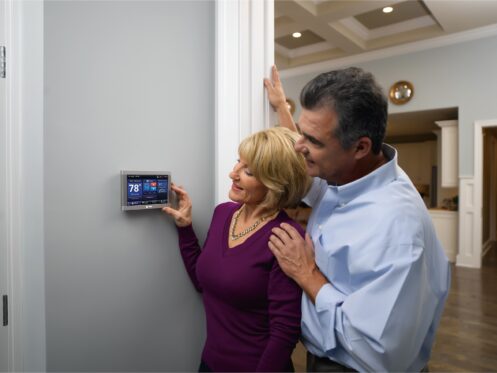The relative humidity inside your Hudson, OH home can vary from one day to the next. High humidity may be the result of rainy weather, showering, cleaning or cooking. Ideally, you should keep your relative humidity between 35% and 50% for optimal comfort.
This range also prevents mold and mildew from growing and negatively impacting your indoor air quality. While opening up windows and doors or running your exhaust fans can help remove some moisture from your indoor air, a whole-home dehumidifier is a great option for controlling humidity regardless of the season or what activities are going on in your residence.
The Basics of a Whole-Home Dehumidifier
Many homes have portable dehumidifiers, which plug directly into a wall outlet and can be moved from one room to another. This makes it hard to address the relative humidity throughout your entire home. They also have water tanks that have to be constantly emptied. Having our team at Bernard Heating & Cooling install a whole-home dehumidifier onto your HVAC system can provide better assistance while your heating or cooling equipment runs.
As a whole-house dehumidifier removes water from the air, it will remove that moisture through a drain line and away from your home. Unlike a portable dehumidifier, there is no need to periodically empty a collection tank. There is minimal maintenance required and may just include cleaning or replacing a filter or ensuring your drain line is clear. We can also provide professional inspections and maintenance for your dehumidifier along with annual routine HVAC service.
Keep in mind, your dehumidifier may come with warranty coverage from the manufacturer. To keep this coverage valid, professional maintenance and repairs may be required. Retain proof of these appointments for future use.
The Benefits of Using a Whole-House Dehumidifier
There are several benefits associated with investing in a whole-house dehumidifier. The initial purchase and installation are relatively affordable. You may be able to utilize rebates or tax credits to offset the cost.
Preventing the Growth of Mold
When the relative humidity level in your home rises above 50%, this sets the stage for mold growth. While maintaining a low relative humidity doesn’t guarantee you won’t deal with mold, it dramatically reduces the risk. You’ll want to keep up with routine plumbing inspections and repairs.
Exposure to mold can be devastating to your health. It can increase allergy symptoms and breathing problems and result in chronic headaches and fatigue. Cognitive issues like brain fog and confusion can also be the result of chronic mold exposure.
Protecting Your HVAC Equipment
To combat high levels of humidity, many homeowners run their air conditioning equipment. This can lead to equipment strain and wear and tear. You may find that you are scheduling frequent repairs or need to replace your AC unit prematurely if you’re relying on it for humidity control. A whole-house dehumidifier removes moisture when your HVAC system is running, making quick work of a moisture problem.
Reducing Your Home’s Energy Use
Using your heating and cooling equipment to control indoor humidity can increase your energy consumption. This raises your monthly utility bills. You can save money and lower your carbon footprint with the installation of a whole-house dehumidifier.
Controlling Allergy Symptoms
If you or someone in your home is prone to allergies, then it’s important that you take steps to reduce the presence of dust and dust mites in your residence. Dust mites thrive in damp conditions. If you manage your relative humidity, this can reduce your population of dust mites. Not only will you feel better, but you’ll sleep better and feel more productive.
People who suffer from skin reactions like eczema and psoriasis may see relief with less humidity in the air. Very moist air coupled with a high concentration of allergens can cause skin to become irritated. This is especially true if mold is present.
How Do You Monitor Relative Humidity?
Being informed regarding how much moisture is in your indoor air can allow you to make beneficial changes. You can use a simple hygrometer to measure relative humidity. Many smart thermostats have a hygrometer built into them. Your dehumidifier will run based on the current RH reading on your thermostat.
Preventing Overly Dry Air
While you may need to remove moisture for comfort and healthy indoor air quality, you don’t want the relative humidity to drop too low. Very dry air can have negative consequences as well. For example, you can experience sinus irritation when relative humidity drops below 35%. Dry air can also cause floors to crack, and damage can occur to your belongings.
If you are dealing with persistent dry air or alternating between very dry and very humid air, you may want to consider the use of a whole-house humidifier as well. This unit also installs onto your HVAC system and can add moisture to your air.
Selecting a Whole-House Dehumidifier
With many options available, it can be difficult to select a whole-house dehumidifier. Our team can help you choose the right unit, ensuring it is the appropriate size. A unit that is too big or too small can experience strain, leading to premature breakdown or repair needs. You may also waste energy by using an improperly sized dehumidifier. Most units come with an ENERGY STAR rating, which explains how much money you’ll spend running that equipment each year.
There are other factors to consider, such as the noise level of your dehumidifier. The type of filter your dehumidifier uses may also impact your decision. If the filter is difficult to clean or expensive to replace, there may be a better option available.
The Importance of Professional Dehumidifier Installation
It’s important to work with our knowledgeable team of professionals for the installation of your dehumidifier. This protects equipment integrity, ensures all work is according to local code and you will have a dehumidifier that works correctly. We also ensure your dehumidifier is an asset to your home that adds value.
Safety is a priority when installing your unit. If something is incorrectly done, this can result in water damage. Even a small bit of water can cause mold to grow, or you can experience damaged belongings. If water meets the frame or foundation of your home, extensive damage can occur. This is a task that we can quickly accomplish for you, ensuring high-quality service every step of the way.
For more information about installing a whole-house dehumidifier or other indoor air quality solutions in the Hudson area, our team here at Bernard Heating & Cooling is available to help. We can assist with the selection of your dehumidifier and install it for you. Performing routine inspections and maintenance for your dehumidifier and HVAC system is also something we take care of. We can help you address your indoor air quality concerns, whether that includes relative humidity issues or problems with particulate matter and other contaminants.
Contact us here at Bernard Heating & Cooling in Hudson to learn more or to schedule an appointment with our experienced team.




